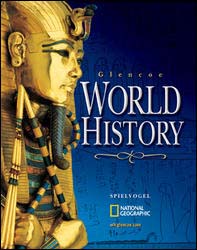Glencoe World HistoryChapter 30:
Africa and the Middle East, 1945–PresentChapter OverviewsAfrican states gained independence after World War II, but troubling conditions and undemocratic rule remain widespread. The Middle East has been the site of much conflict. The Islamic revival has affected the lives of people throughout the Middle East. Section 1 Independence in Africa
Independent African states emerged after World War II with high hopes for democracy. Many African leaders advocated Western-style capitalism. Others called for an African form of socialism. Pan-Africanism was also a popular political creed, although African unity never became a political reality. Indeed, bloody wars between competing ethnic groups have been common. Economic challenges have included the need to import technology and manufactured goods, and to confront rapid population growth and drought. AIDS has become widespread. Despite attempts at democracy, one-party states and corrupt military regimes have been more typical. However, protest has brought some democratic change. The struggle to end apartheid resulted in the election of anti-apartheid leader Nelson Mandela as president of South Africa. Pockets of Western culture in Africa's cities contrast with the traditional life in rural areas. Tension between traditional and modern practices has been a dilemma for many Africans and is reflected in African art and literature. Section 2 Conflict in the Middle East
A 1947 United Nations resolution divided Palestine into a Jewish state and an Arab state. However, the problem of Palestinian refugees from that time has persisted. During the 1950s Gamal Abdel Nasser became the leader of the Pan-Arab movement. Nasser's confrontation with Israel led to the Six Day War, in which Israel gained large pieces of territory and brought one million more Palestinians under its control. During the 1973 Arab-Israeli War, oil price hikes led to economic problems in Europe and the United States. The intifada, a popular Palestinian uprising, led to negotiations on Palestinian autonomy, although progress has been slow. A revolution in Iran ended American ties with a close ally and led to an Islamic republic ruled by Islamic law. Iran and Iraq fought a brutal war. Iraqi President Saddam Hussein invaded Kuwait but was forced to withdraw after an American-led force organized to free Kuwait. In Afghanistan, rule of the country has shifted from Communist supporters to the Islamic Taliban and now an alliance. Conservative Muslims have increasingly enforced Islamic behavior in the Middle East.  | 

















